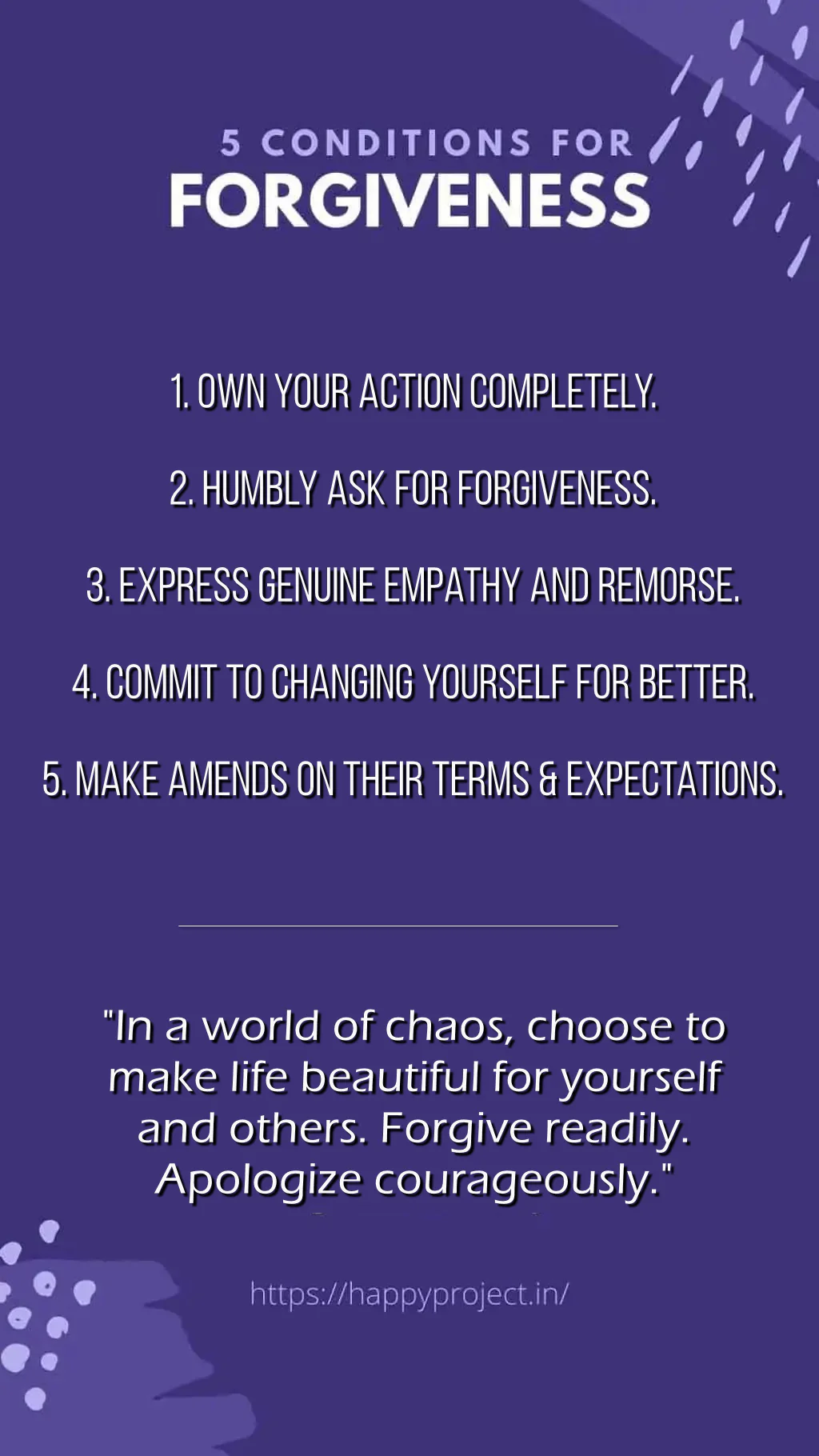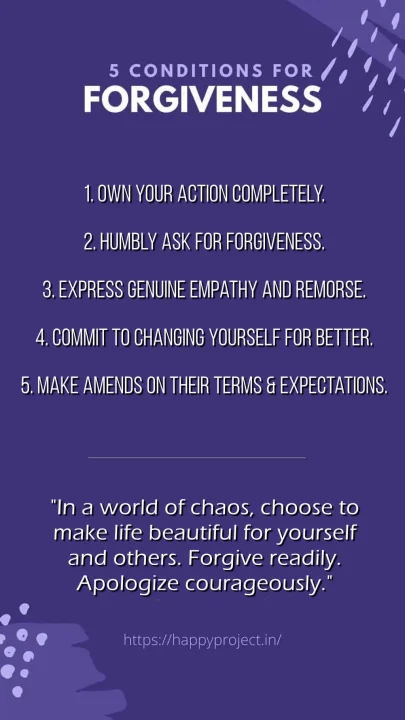Today's Friday • 12 mins read
“We are all faced with a series of great opportunities brilliantly disguised as impossible situations.”
— Charles Swindoll
In a perfect world, none of us would need to ask for forgiveness. That would be a future of mistakeless machines governing humanity.
But in our human world, mistakes are the norm. So, too, is the need to seek forgiveness.
We seek it not just to repair bonds with others, but to ultimately make peace with ourselves.
Yet, forgiveness remains elusive.
How To Make Someone Forgive You For Hurting Them
You hurt them. But you quickly regretted it.
Only a few people have the will or courage to forgive us without our having to ask. So you went to ask for their forgiveness. But they won’t forgive you.
So, how do we get their forgiveness when they are reluctant?

Here are some ways you could make someone forgive you:
1. Make them see your painful state.
Empathy and compassion can help people forgive and let go of their anger easier.
Empathy is the understanding of how they are feeling after our wrongdoing. It is about walking in their shoes trying to feel the same emotions and think the same thoughts as they do.
Empathy is effective in making someone forgive you.
Let them know that you are going through many hurtful emotions.
Helping them see and feel your distress can persuade them to accept your forgiveness.
Show and tell them that you want them to understand your pain, anger, sorrow, sadness, regret, and fear.
You would notice them becoming more willing to forgive you to reduce those feelings.
This is because it takes away their excuses of denial to understand your anguish, making them feel sorry for your plight and eager to make things normal again.
2. Offer them a half-apology until they can forgive you fully.
Sometimes, a hurt person may not be able to forgive you completely in one go.
But they can see that your incomplete apology means you have assumed responsibility for your misdeed and will accept the consequences of your actions.
It shows the person you hurt that you have a conscience. It is a way to let go of the anger and hatred that often results from being hurt.
A Complete Apology comes with five in-built conditions in the following sequence:
- Acceptance: Acceptance of their mistake.
- Remorse: Telling you that they are regretful.
- Humility: Asking for your forgiveness with humility.
- Assurance: Assuring that they won’t repeat it in the future.
- Correction: Asking you what do you expect them to do to set things right.
Most often, a full apology is not justified by the belief that you were not entirely wrong to have offended them. Perhaps you took the action in retaliation for a mistake they made long back.
Their conscience may be preventing them from accepting unconditional apologies because they fear that full forgiveness may encourage a repeat of your misbehavior.
Offer the half-apology while keeping your doors open for the full version.
Forgiveness may come in installments. When we want someone to forgive us completely, all of it may not come at once.
The sufferer may keep checking our post-apology behavior and forgive us in limited ways as they feel safer and more assured.
Keep that in mind and do not ruin your victim’s healing process by demanding quick forgiveness.
3. Create the right environment for forgiveness.
A crucial thing is to build an environment for reciprocal respect when they ask for your forgiveness.
It starts with finding the right time and space for both of you.
Inviting them to a celebratory event, like your birthday or wedding anniversary, may give them the courage to forgive you.
They will be aware that it is a special occasion for you and you may have invited them to help restore normalcy in your relationship.
If they bring in any little gesture of goodwill, such as flowers or a present, it can show that the other person is willing to put in some effort to accept your appeals of forgiveness.
It’s difficult to forgive those who have wronged us. We often push them away and spend more time thinking about what they did wrong rather than trying to find a solution. The same would be true for those who have wronged us.
Allow them time and space to process their shock at our wrongdoing. Inform them, via message or email, that you feel sorry about the incident and would like to speak with them about it when they are ready.
Ask when would be a good time for them to have that conversation. If they agree, let them choose a place to meet so that they feel safe. You may suggest a few places, like a barista or a bistro.
4. Try to remain transparent and honest.
One of the most important conditions for forgiveness is being honest about the mistake.
Take full responsibility for your mistake with complete integrity, without hedging or hemming.
You must not lie about it, nor should you talk about it as if it were a small misstep.
Offer them a simple acceptance.
Do not say, “It wasn’t entirely my fault. It was the circumstance. What could I possibly have done about it?”
Doing so only adds more fuel to their anger or bitterness.
In any case, if an apology is dishonest, they will find out about it later, which will only make things worse.
If they see you are feeling guilty, they will accept it as a way forward.
People who do not feel guilty are often social skunks who believe they are so entitled that they have never made a mistake.
Scientists tell us that guilt and shame have a negative association with narcissistic people, particularly the grandiose subtype (Czarna, 2014).
It means that the more a person’s narcissism, the less guilty they feel. But guilt is good as it prompts us to mend our ways and ask for forgiveness.
5. Write an apology letter.
Writing a sincere apology letter is a good way to keep a record of how hard you tried to make them forgive you.
Writing someone instead of speaking to them is a better approach to asking for forgiveness.
- First, you can present your thoughts in a neatly arranged way.
- Second, they may re-read parts of your apology letter to better understand your perspective.
Write your words of apology from the heart, do not copy from a template.
Many people prefer to deliver the letter in person rather than mail it. Writing can help clear our minds and arrange our thoughts neatly.
After that, it is vital you refrain from contacting this person until they accept your apology.
Finally, if they reject your apology, it’s best not to try again because they may interpret it as your attempt to guilt-trip them.
6. Wait patiently for normalcy and full forgiveness.
Forgiveness is often a long-drawn process. Not everyone can forgive easily or quickly. Sometimes, it may take years and many apologies to be fully forgiven. So, do not rush it.
Forgiveness may come late because of the misperceptions they have against forgiving. They may feel that forgiving is to appear weak or condone the act.
Some people think holding on to the hurt is more manageable than accepting an insincere apology, so they wait before extending forgiveness.
Another reason for the late forgiveness may be the victim feels the pain of the hurt is too unbearable to allow forgiveness promptly.
Many think non-forgiveness is an effective excuse to keep that person away from their life.
If not forgiven, the perpetrator will have doubts about trying to reconnect or reconcile, and may finally give up their attempts.
Deborah Schurman-Kauflin, a retired criminal profiler who has studied and investigated serial killers for more than 20 years, says one may successfully move on and heal themselves without forgiving the wrongdoer.
She even feels that forcing or faking forgiveness can slow down or block the healing process.
If they don’t forgive you, accept that and move on.
7. Apologizing again, after they have forgiven you.
Apologize again if necessary after they have accepted your apology because people tend to feel uneasy about forgiving.
They often feel as if forgiving was the right thing to do because they are not sure if you would do the same thing again.
It’s also important to find out if the other person is still angry or upset with us. If they are still sad or resentful, it is almost imperative to apologize again, unless they have cut off all contact with us.
The good thing is, that most of us understand when our mistakes have caused deep emotional distress.
When we hurt people we care about, the guilt makes us feel terrible, so we want to apologize. We feel we can’t move on until we know we’ve said “I’m sorry” to the people we’ve hurt.
It is often difficult to make someone forgive you for your grave mistakes, but it is not entirely impossible. It could take time, but we could get it done with a little effort.
5 Conditions of Forgiveness
A true apology is about repair, not just regret. It’s a brave and humble process to heal a connection you value. To make your apology count, embrace these five steps:

- 1. Own Your Action Completely. This is the foundation. Use first-person language. Say “I was wrong” without the filter of excuse or explanation, demonstrating true accountability. Avoid the slightly clinical word “mistake,” which can sometimes minimize a more significant hurt.
- 2. Humbly Ask for Forgiveness. Approach not with entitlement but with vulnerability. A genuine request must acknowledge that forgiveness is a gift to be given, not a debt to be owed. Place the power to heal the rift entirely in the hands of the one you hurt.
- 3. Express Genuine Empathy and Remorse. Move beyond a simple “I’m sorry” to “I understand how I hurt you.” Show that your focus is on the pain you caused them, not on your own feelings of regret or discomfort.
- 4. Commit to Changing Yourself For The Better. Transform your words into a trustworthy promise. This commitment is the bridge from regret to change. You’re declaring that you’ll dedicate yourself to making sure the hurtful behavior will not be repeated.
- 5. Make Amends on Their Terms & Expectations. Complete the repair by asking, “What can I do to make this right?” Empower them to define what true restitution looks like. So they know that your efforts are for their genuine healing rather than self-serving.
Psychology of Forgiveness
Psychology defines forgiveness as a deliberate decision to release feelings of resentment or vengeance toward those who harmed you, irrespective of whether they deserve your forgiveness.
Forgiveness involves giving up the demand to punish the wrongdoer and decreasing negative feelings towards them. It also means seeing the event from a neutral point of view and full acceptance.
Forgiveness is of two types:
- Decisional forgiveness: when you decide to change your behavior towards the person, but do not change your feelings. You do not let go of the anger or vengefulness. It keeps your hurt alive.
- Emotional forgiveness: when you let go of the anger and resentment towards your offender, along with changing your behavior towards them. It can improve your well-being and reduce your risk of heart disease, stress, anxiety, and depression.
Research shows harboring anger, resentment, and malevolence can have a detrimental impact on our physical and emotional health and our relationships (Gordon et al., 2009). But when people report higher levels of forgiveness, they also tend to report healthier habits and lower levels of depression, anxiety, and anger.
Forgiveness is often misunderstood as condoning the wrongdoing or as an obligation to reconcile with the offender. It’s neither.
True forgiveness is a decision to make peace with the past. You accept that you cannot go back in time to choose a better version of events.
Why It Is Difficult To Make Someone Forgive Us
Earning genuine forgiveness is hard because our apologies often carry self-defense or come with no intent to change.
The most common failure occurs when we offer a few words of apology but then use a large number of words to defend, justify, or explain away our hurtful behavior. We may even become aggressive, claiming we acted “for the best” or that we “didn’t understand” how it would cause pain.
This sends a conflicting message: the apology rings hollow because the defense screams that we believe our actions were, ultimately, justified.
This leads to two justifiable doubts in the other person’s mind:
- Is the apology genuine? If we are more invested in defending ourselves than understanding their hurt, our regret seems insincere.
- Will this person not repeat their action? Since we fail to promise change or make amends, they have no reason to trust that the hurt won’t happen again.
Some of us worsen this by treating forgiveness as a default behavior in others, something we can trigger with a simple “Sorry.” This is a failure of empathy.
We forget that forgiveness is not an obligation; it is a gift. Trying to manipulate or pressure someone into granting it (perhaps by guilt-tripping them or highlighting our own pain) only tortures the victim further and makes true forgiveness impossible.
Ultimately, earning forgiveness has nothing to do with how we feel about our own apology. It hinges entirely on whether the victim decides to forgive us.
The path to forgiveness requires us to silence our own justifications, listen attentively to the pain we’ve caused, and offer a sincere commitment to change, without expectation to be forgiven.
Final Words
The first rule of forgiveness is to ask for it with humility but without any expectation.
Even if a person is gracious enough to forgive us without asking, they may do so with sadness in their heart. They forgive us, but they also suffer a great deal of unspoken pain every time our past actions trigger their memory.
The best way to get someone to forgive us is to show we understand we caused them hurt and genuinely care about what they have to say. At all times, show that you commit to change.
• • •
√ Also Read: How Do Narcissists React When They Can’t Control You?
√ Please share this if you found it helpful.
√ If you liked it, please spread the word.
